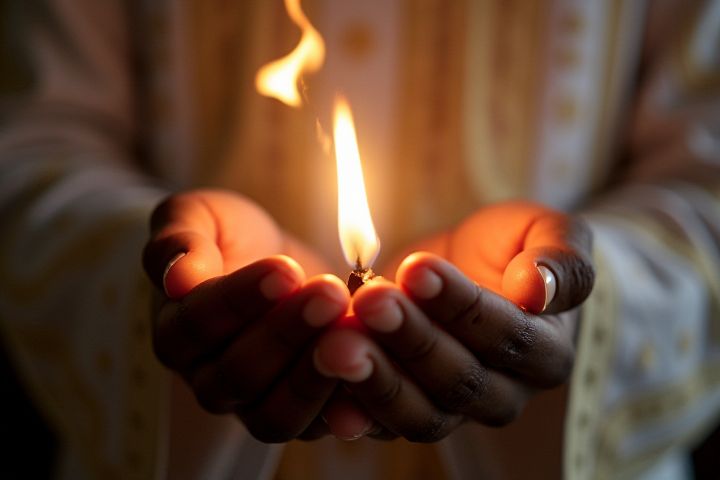
Nigeria is a diverse nation with a rich tapestry of religious practices, primarily comprising Islam and Christianity, along with various indigenous beliefs. Islam predominantly influences the northern region, where daily prayers, Ramadan observance, and pilgrimage to Mecca are integral to community life. In the southern regions, Christianity thrives, with numerous denominations, vibrant worship services, and events like Christmas and Easter celebrated widely. Your understanding of indigenous religions reveals a deep connection to ancestral worship, rituals, and festivals that honor nature and spirits. Each religious practice not only shapes cultural identities but also plays a significant role in Nigeria's social dynamics and conflict resolutions.
Diverse Spiritual Traditions
Nigeria is home to a rich tapestry of religious practices that include Christianity, Islam, and indigenous African religions, each contributing to the country's vibrant spiritual landscape. Traditional beliefs often emphasize ancestral worship, communal rituals, and the reverence of nature, showcasing the deep-rooted connection to heritage and identity. Within Christianity, numerous denominations such as Catholicism, Pentecostalism, and Anglicanism reflect varying theological interpretations and worship styles. Meanwhile, Islam, predominantly Sunni, plays a significant role in northern Nigeria, with unique cultural expressions and practices that enrich the country's overall religious identity.
Predominance of Christianity
In Nigeria, Christianity is the predominant religion, practiced by over 50% of the population, particularly in the southern and central regions. Major denominations include Catholicism, Anglicanism, and various Pentecostal movements, each contributing to the rich tapestry of worship styles and community engagements. Religious festivals, such as Christmas and Easter, play a significant role in cultural life, often featuring vibrant celebrations, music, and communal gatherings. Churches also serve as social hubs, providing educational programs, charity initiatives, and support networks for their congregations.
Influence of Islam
Islam in Nigeria is predominantly represented by the Sunni sect, with significant cultural integration across various ethnic groups. The influence of Islam is particularly pronounced in the northern regions, where it shapes social norms, legal systems, and community structures. Islamic festivals, such as Eid al-Fitr and Eid al-Adha, are widely celebrated and deeply embedded in the local culture. You may find that the presence of Islamic schools, mosques, and community organizations contributes to a vibrant religious landscape that encourages interfaith dialogue and coexistence with other religions, such as Christianity and indigenous beliefs.
Syncretism
Nigeria's religious landscape is characterized by a vibrant blend of traditions, where syncretism plays a crucial role in shaping beliefs and practices. Many communities seamlessly integrate indigenous spiritual systems with Christianity and Islam, creating unique rituals and festivals that reflect their cultural heritage. This fusion not only fosters a sense of unity among diverse ethnic groups but also allows for the adaptation of beliefs to contemporary life. Engaging with these syncretic practices can deepen your understanding of Nigeria's rich spiritual tapestry and its implications on social dynamics.
Importance of Festivals
In Nigeria, festivals serve as a vibrant expression of religious and cultural identity, attracting both locals and tourists. Major ethnic groups, such as the Yoruba, Igbo, and Hausa, each host unique festivals that are deeply rooted in their spiritual beliefs, showcasing colorful ceremonies, music, and traditional attire. Events like the Osun-Osogbo Festival enhance community bonding and spiritual rejuvenation, emphasizing the significance of nature and ancestral reverence. Your experience of these festivals offers insight into Nigeria's rich tapestry of beliefs, where faith and culture intertwine harmoniously.
Traditional Religions
Nigeria's religious landscape is rich and diverse, with Traditional Religions deeply rooted in cultural heritage. These indigenous beliefs prioritize the veneration of ancestors, spirits, and natural elements, reflecting a profound connection to nature and community. Rituals often involve elaborate ceremonies, festivals, and offerings, aimed at seeking protection, guidance, and blessings. You may find that the syncretism with Christianity and Islam in urban areas showcases the adaptability of theseTraditional Religions, highlighting their enduring relevance in contemporary Nigerian society.
Role of Religious Leaders
In Nigeria, religious leaders play a pivotal role in shaping communities, guiding spiritual beliefs, and influencing social values. These leaders, often prominent figures within various faiths such as Islam and Christianity, serve as mediators between the divine and their followers, providing spiritual advice and moral direction. Their influence extends to social issues, as they mobilize congregations for humanitarian efforts and advocate for peace and unity in a diverse nation. Recognizing the power of these religious figures can enhance your understanding of Nigeria's complex societal dynamics and cultural heritage.
Cultural Integration
Religious practices in Nigeria demonstrate a rich tapestry of cultural integration, where indigenous beliefs, Christianity, and Islam coexist harmoniously. Traditional rituals often intersect with religious ceremonies, showcasing a unique blend of spirituality and cultural identity. Festivals, such as the Osun-Osogbo and Eid al-Fitr, highlight this cultural synergy by bringing communities together in celebration and worship. This integration not only strengthens social bonds but also preserves the diverse heritage of Nigeria's ethnic groups, reflecting the nation's pluralistic society.
Pilgrimage Importance
In Nigeria, pilgrimage holds significant cultural and spiritual importance across various religions, particularly Islam and Christianity. The Hajj pilgrimage to Mecca is a deeply revered obligation for Muslims, symbolizing unity and faith, while Christians often embark on pilgrimages to sites like the holy city of Jerusalem to strengthen their spiritual connection. These journeys not only promote religious devotion but also foster a sense of community among pilgrims as they share experiences and deepen their faith. Engaging in pilgrimage can enhance your understanding of spiritual heritage and serve as a transformative journey toward personal growth and enlightenment.
Religion in Politics
In Nigeria, religious practices play a significant role in shaping political dynamics, with Islam and Christianity being the predominant faiths influencing governance and societal norms. Political leaders often mobilize religious sentiments to gain support, which can lead to a blending of religious ideologies with political agendas. Religious institutions, such as mosques and churches, serve as vital platforms for community engagement and political discourse, shaping public opinion and electoral outcomes. As a citizen, your understanding of this intersection between religion and politics can enhance your awareness of Nigeria's complex socio-political landscape.
